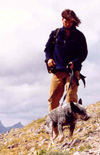 |
Co-authors Elena Shpak, Keiko Torii, Jessica McAbee and Lynn Pillitteri display plants they used to research a trio of genes responsible for moisture retention. They published their results in the July 8, 2005 issue of Science. |
A team of four UW Biology scientists have been studying plant growth as part of U.S. Department of Energy and Japanese Science and Technology Agency-funded grant focusing on plant material, or biomass, suitable for producing fuel. In the process the researchers discovered that gene signals that make plants grow to their normal size may also keep the plants from wallpapering themselves with too many densely clustered stomata.
Stomata are microscopic pores on the surface of plants that open to allow plants to take in carbon dioxide from the air for photosynthesis. They close when there is danger that the plant tissue may lose too much moisture. "Specialized cells open and close the stomata, much like opening and closing a mouth," says Keiko Torii, UW professor of biology. Stomata too close together can't operate effectively.
Read the full length version of this UWeek article published here.



 Together this dog and his trainer, Heath Smith, search for sign from grizzlies in Alberta, Canada. They are part of a novel and non-invasive animal tracking program started at the Center for Conservation Biology. This program is one of several at the department that conducts research to help save the lives of endangered species.
Every bit counts. Your choice to support the Department of Biology could make a big difference in how our future turns out.
Together this dog and his trainer, Heath Smith, search for sign from grizzlies in Alberta, Canada. They are part of a novel and non-invasive animal tracking program started at the Center for Conservation Biology. This program is one of several at the department that conducts research to help save the lives of endangered species.
Every bit counts. Your choice to support the Department of Biology could make a big difference in how our future turns out.